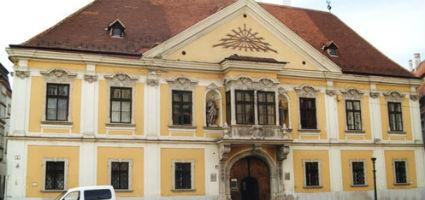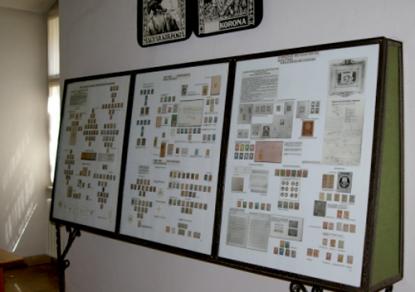2025. April 26. Saturday
János Xántus Museum - Győr
 |
Address: 9022, Győr Széchenyi tér 5.
Phone number: (96) 310-588
E-mail: xantus@gymsmuzeum.hu
Opening hours: 01.10-01.04.: Tue-Sat 10-16
|
Museum tickets, service costs:
|
Individual ticket for adults
|
800 HUF
|
|
|
Individual ticket for adults
(valid for the temporal exhibitions)
|
300 HUF
|
|
|
Individual ticket for students
|
400 HUF
|
|
|
Individual ticket for students
(valid for the temporal exhibitions)
|
150 HUF
|
|
|
Individual ticket for pensioners
|
400 HUF
|
|
|
Individual ticket for pensioners
(valid for the temporal exhibitions)
|
150 HUF
|
|
|
Ticket for families
|
1800 HUF
|
/ family
|
|
Season ticket for students
(school season ticket )
|
22000 HUF
|
/ half a year
|
|
Guide
|
3000 HUF
|
Stamps of Hungarian Post Administration were solely made in the National Press from 1871 until 1949. Stamp production began with lithography. The first stamp made with mixed technique was made in 1888, as well as series printed in 1919 and 1920.

Stamps have been printed in the Bank Currency Press since 1949. The Petőfi series was made in the same year. Later stamps were made with mixed technique: line engraving, steel-engraving etc.
In Hungary, stamps were made from steel-engraving in the Bank Currency Press first. Brighter colours and the mixed technique applied resulted in beautiful notes.
We show curiosities that came off during making. These were often produced in the 'classic era'.
In the year 1881, curiosities were worth 10 'krajcár'. One of the most well known of the stamps with wrong marking was from the year 1913, the 'Turul' and the 'Harvester' 1921/24.
Several of the designers Légrády Sándor, Vertel József, Gál Ferenc and Zombory Éva were internationally acclaimed.
The permanent exhibition shows stamp series from 1871 until 1987.

Stamps have been printed in the Bank Currency Press since 1949. The Petőfi series was made in the same year. Later stamps were made with mixed technique: line engraving, steel-engraving etc.
In Hungary, stamps were made from steel-engraving in the Bank Currency Press first. Brighter colours and the mixed technique applied resulted in beautiful notes.
We show curiosities that came off during making. These were often produced in the 'classic era'.
In the year 1881, curiosities were worth 10 'krajcár'. One of the most well known of the stamps with wrong marking was from the year 1913, the 'Turul' and the 'Harvester' 1921/24.
Several of the designers Légrády Sándor, Vertel József, Gál Ferenc and Zombory Éva were internationally acclaimed.
The permanent exhibition shows stamp series from 1871 until 1987.
